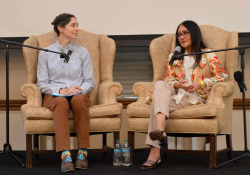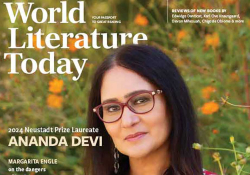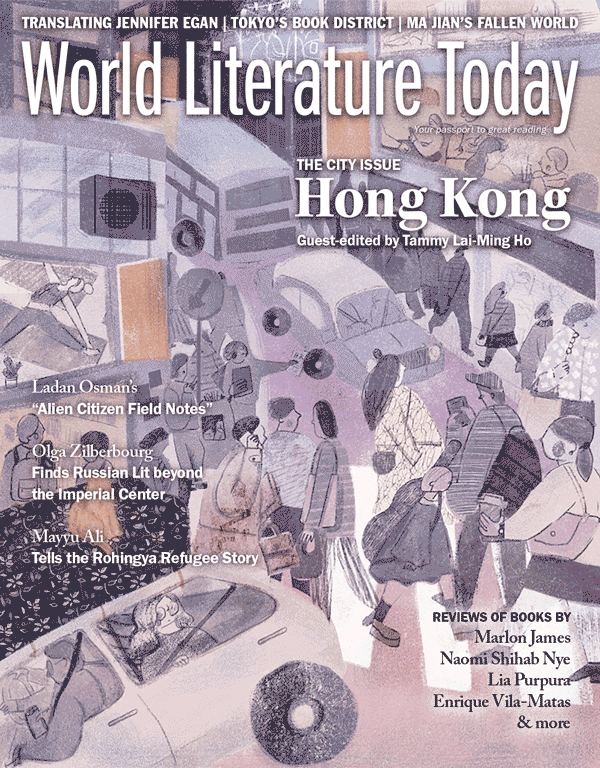Editor’s Note
 What to do with the time traveler, the stranger, the alien? – Ladan Osman
What to do with the time traveler, the stranger, the alien? – Ladan Osman
What do Hong Kong and Niger have in common, apart from being on opposite ends of the UN Human Development Index? (On the 2018 index, Hong Kong ranks 7th, while Niger ranks at the very bottom, at 189th.) For starters, both were outposts of the British and French empires, respectively. Yet a succession of imperial dynasties—Songhai, Hausa, Mandinka—ruled the region that would become Niger for more than a thousand years prior to France’s arrival, and several others—Qin, Ming, Qing—have occupied present-day Hong Kong since the third century bce. Both lay on key trade routes, served as transit points for human and cultural migration, and became nexuses of contact and conflict. In Hong Kong, packed into just over 400 square miles, the population of seven-plus million is tightly woven; in Niger—the largest country in West Africa, spread across 490,000 square miles—vast expanses beyond the Sahel are rarely touched by human habitation, even though the region has been traversed by caravans since time immemorial.
While remote from each other geographically, Niger and Hong Kong share space in the current issue of World Literature Today: in Ladan Osman’s “Alien Citizen Field Notes” photo-essay and in the cover feature guest-edited by Tammy Lai-Ming Ho, respectively. The Hong Kong feature, the first “city issue” in an annual series, presents a mix of essays and poetry as well as a booklist of recommended reading about the city, along with commissioned illustrations by the artist Yang and various photographs of the cityscape, all reflecting the rich mix of languages and foodways a visitor might encounter there on a daily basis.
Reporting from Niger, Osman presents a starkly different human landscape. Her project immediately confronts readers with an oxymoron: how is it possible to be both alien and citizen at once, if each term axiomatically excludes the other? The Latin adjective aliēnus, the etymon of the English term alien, unsettles the mind with a continuum of otherness: “of or belonging to others, unnatural, unusual, unconnected, separate, of another country, foreign, unrelated, of a different variety or species, unfamiliar, strange, unfriendly, unsympathetic, unfavourable, inappropriate, incompatible, distasteful, repugnant, (noun) person or slave belonging to another person, foreigner, stranger, outsider.” The OED also notes uses of the term in linguistics, in reference to loanwords, and in biology, at the level of DNA or cell tissue, beginning in the late nineteenth century with the rise of the pseudoscience of eugenics within such venerated bodies as the Royal Society of London (“I therefore determined to inject alien blood into the circulation of pure varieties of animals . . . and to note whether their offspring did or did not show signs of mongrelism”).
To be a citizen, on the other hand—a term originally applied to the inhabitants of ancient Rome and to the rights attendant on that privilege—today implicates the discourses of entire nation-states: those who assert their right to belong, and those on the outside, waiting to be allowed in. Osman calls our attention to the dehumanization involved in such labeling, painfully aware of the element of unseeing in her own observations, and encourages us to move toward empathetic listening—getting ready to depart NYC for Niamey, the capital of Niger, she listens to Puccini’s “Un bel dì,” then hears a “diasporic libretto” on the ground in West Africa. In 2019, citizenship is often used as a loaded gun, aimed at the foreigner, the stranger, the impure “mongrel” at the border . . .
Throughout her three-part essay, Osman pays close attention to the “story-shaping . . . myth-making, and nation-building” narratives that often colonize identity. She notes the shifting deixis of place in such markers as “here” versus “there,” how her own mobility is implicated in others’ unfreedom when it comes to making decisions about whether to stay rooted in a place or to depart for opportunities elsewhere. From the oasis town of Dirkou, Osman writes: “I rage-cry at night, cooling my face in forgiving breezes, gasping alone at twilight with no fear because I’m a stranger anyway, my behavior alien.” Again, that word alien. Earlier in the same essay, she writes: “Jurisdiction blurs as people are defined by their circumstances rather than their citizenship, and by how their motions affect national or European concerns.”
In between such definitional labels, and often circumventing them, the human—and humanizing—act of story-shaping continues.
Daniel Simon









